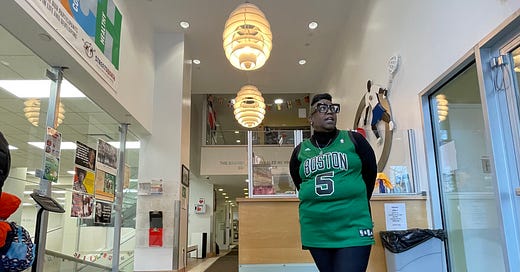Uptown Squash
Monique Hendricks explains the success of Harlem's Street Squash in a neighborhood foreign to the international sport.
For many who stumble upon Street Squash Harlem, it's a hidden gem, a place they never knew existed. But for the students who walk through its doors, it's a community hub, an academic and athletic haven, and a place where they are nurtured and supported. At the heart of this bustling activity is Monique Hendricks, the welcoming face at the front desk, a constant presence who has seen countless students grow and graduate over the years.
Hendricks' connection to Street Squash runs deep. She started working at Street Squash five years after her son played there. She applied for a position in 2013 when there was an opening at the front desk. Since then, she has become an indispensable part of the organization, the first and often the last person people interact with. Her warm smile and genuine care create an inviting atmosphere for everyone who enters.
For Hendricks, Street Squash is more than just a job; it's a vital part of the Harlem community. She sees it as a place where young people, regardless of their background, can find support and direction. She often wonders why more people don't step inside to discover the enriching environment within. "What is this for? People walk by here all the time. They see me coming in here. Ask me. I’ll tell you," she says, emphasizing her willingness to share the story of Street Squash with anyone who shows even a flicker of interest, actively encouraging local residents to get involved.
Hendricks enthusiastically highlights the other avenues for participation, regardless of whether someone has children in the program or any prior experience with squash. "We have Community squash here on Mondays and Wednesdays from 6:30PM to 7:30PM. You don't even have to know how to play. They teach you," she explains, extending an open invitation.
Hendricks also emphasizes the need for academic support and mentorship, appealing to those with skills and time to share. "I want them to know that this is a place where you can come volunteer academically if you don’t know how to play squash. It's all about Community. It's about a village. You got to get with these kids," Hendricks passionately states, underscoring the program's dependence on volunteers.
Her commitment to the students is deeply personal. She views their success as a reflection of the collective effort of the Street Squash community. "I've been telling them that y'all are my future. When y’all successful that means I did my job," Hendricks declares with pride. She expresses gratitude to the seniors moving on for allowing her to be a part of their journey, recognizing that their participation is essential to the program's existence.
"I always thank every graduating class. Thank you for letting me have a little part of your growing. You didn't have to be here. Your parents didn't have to let you come here. You’ve seen it through. You went to college or work or whatever you’re doing. Thank you for letting me be a part of that because without them I wouldn't have a job. I wouldn't be here. This place wouldn't stay open if we didn't have participation," she acknowledges, highlighting the symbiotic relationship between the students and the program.
The support provided by Street Squash extends far beyond the students' time in the program. Hendricks proudly describes the long-term network of support that continues even after graduation. "We have kids from grades 5 through 12 and then after they graduate from high school they stay with the alumni for 6 years for support. If they are in college or a career - whatever they need. We have alumni that come back looking for a job? We have people that can help find jobs or internships. It's all about networking," she explains, emphasizing the enduring nature of the Street Squash community.
"My son is an only child,” Hendricks shares. “He came here and developed lifelong friends, you know, that he's still in contact with. It’s a community," she recounts, highlighting the social benefits and the sense of belonging the program fosters. Even though squash might not be a game traditionally associated with their community, the students embrace it and thrive within the supportive environment.”
"This game may not be intended for us, but they get in here and they do the damn thing," Hendricks concludes with a sense of admiration and pride for the young people of Street Squash. Her words encapsulate the spirit of the organization: a place where young individuals from Harlem find community, support, and the opportunity to excel, all under the watchful and caring eyes of its matriarch, Monique Hendricks, at the front desk.




